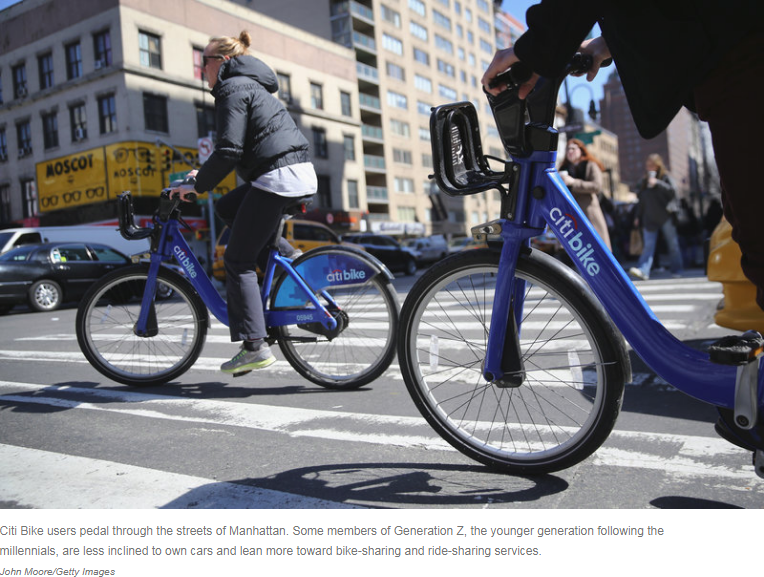
by Innovative Mobility Research | Dec 8, 2017 |
December 8, 2017 By: NATALIE BETTENDORF Sheryl Connelly has a crazy job. She’s in charge of looking into the future for Ford Motor Co. The automaker is trying to predict how people my age — from Generation Z — will use cars. “I have two Gen Zers at home,” Connelly says. “So my 16-year-old daughter is thrilled, actually. Her car is ready to go. As soon as she has her license, it’s in the driveway. And so she sits in her car and she listens to the radio and she loves her car.” That’s definitely not me. I’m 18 and I don’t want a car. I am from the San Francisco Bay Area. I take buses and trains. I bike, and when I need a car, I use Lyft. Connelly says Gen Z is a game changer. “They don’t really care about ownership,” she says. “They don’t necessarily see that their vehicle is going to be a status symbol. In fact, they’re really savvy customers and can be quite frugal.” Read the rest of the article...
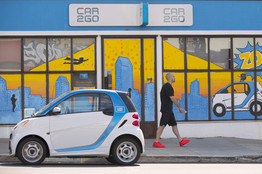
by Innovative Mobility Research | Jul 19, 2017 |
By Adrienne Roberts Updated July 14, 2017 2:33 p.m. ET America’s car-sharing industry is struggling as some major operators scale back because of weak demand in certain cities, vandalism and competition from ride-hailing services like Uber. Enterprise Holdings Inc.’s Enterprise Rent-A-Car closed its CarShare membership service in six major cities in recent weeks, following similar moves by other providers. To read the full story, visit:...
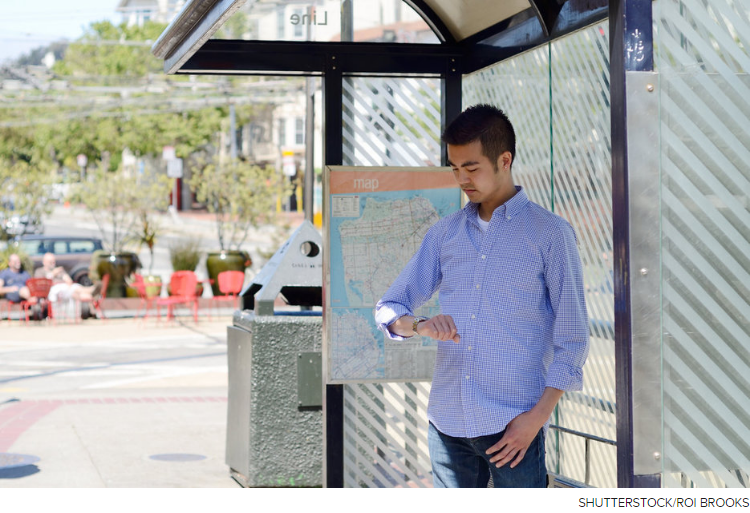
by Innovative Mobility Research | Oct 19, 2016 |
BY BEN MILLER SEPTEMBER 7, 2016 BERKELEY, CALIF. — The future of transportation could very well be unrecognizable compared with today’s system: self-driving pods packed with carpoolers, electric motors, multi-modal journeys, invisible conversations between machines. But that’s the future. And while some of these things are beginning to creep into society, Susan Shaheen isn’t ready to fly the banner of the future just yet. Shaheen, co-director of the Transportation Sustainability Research Center at the University of California, Berkeley, has studied the future of transportation for two decades. Speaking to government and private-sector transportation workers on Sept. 7 at the Bridge SF conference, her message was this: We’re still waiting for the revolution, but there are some very interesting changes in the wind. To read the full article, visit:...
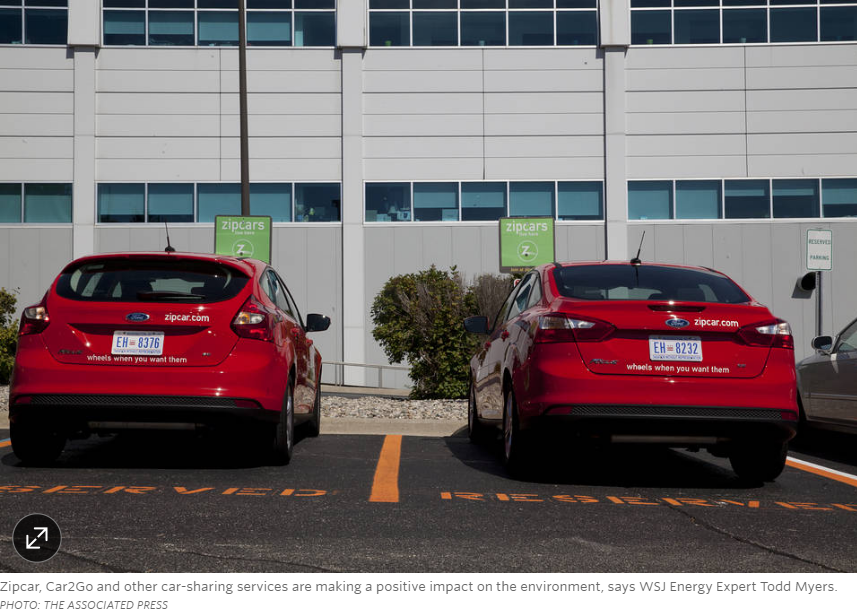
by Innovative Mobility Research | Oct 19, 2016 |
By TODD MYERS Sep 13, 2016 The proliferation of car-sharing services in major cities is evidence that this new transportation option is popular with consumers, likely because it’s cheaper to share a car than own one. But what impact has it had on the environment? New research, from the City of Seattle and university researchers finds positive environmental results. Car sharing is a rent-by-the-hour system, where users find a car nearby using a smartphone app. Members then unlock the car and use it as long as they like, returning it to one of many areas around town. The availability of the cars makes them a quick and easy way to travel, without having to wait for a bus or commit to the full-day rate of a traditional rental car. To read the full article, visit:...
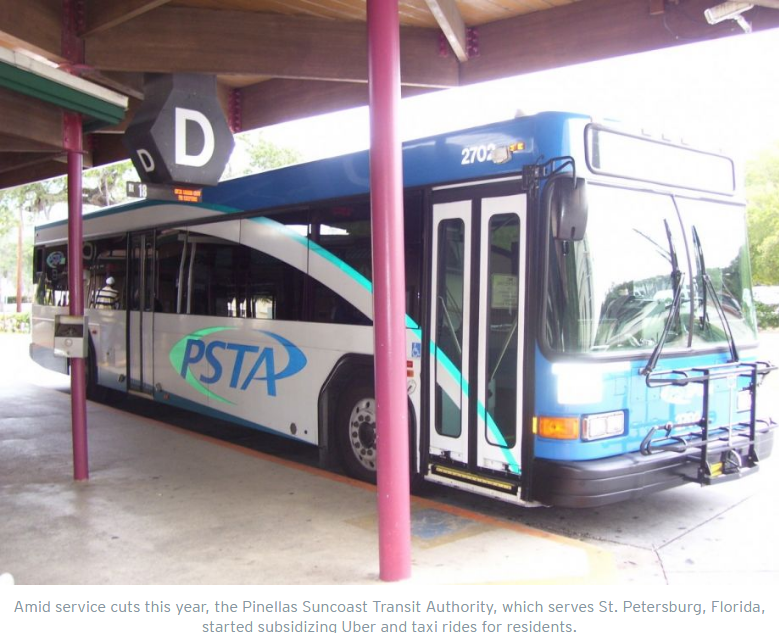
by Innovative Mobility Research | Oct 19, 2016 |
BY JOSH COHEN SEPTEMBER 8, 2016 In St. Petersburg, Florida — a city of about 257,000 residents sitting on the Gulf Coast next to Tampa — people have just a few options for getting around town. They can, of course, drive personal cars, walk or bike; catch a bus operated by the Pinellas Suncoast Transit Authority (PSTA); or hire taxis and Ubers. From February to August this year, the last mode choice on that list was likely the cheapest, most efficient option for accessing the bus. In an effort to encourage transit ridership and alleviate the impact of service cuts brought on by budget woes, PSTA was subsidizing 50 percent of the cost of taking rides with Uber, United Taxi (the local cab company) or Care Ride (a paratransit service) if those rides were connecting to the bus. That sort of partnership between public transit agency and ride-hailing company isn’t yet common, but examples are popping up around the country as cash-strapped municipalities look for ways to supplement their bus and rail routes and better serve low-density areas with so-so transit ridership. Those in favor of the arrangement say taking advantage of new technologies and service providers is a win-win for forward-looking transit agencies. Skeptics caution that the things that make companies such as Uber and Lyft profitable are incompatible with transit agencies’ obligation to provide quality, convenient, equitable service. To read the full article, visit:...






